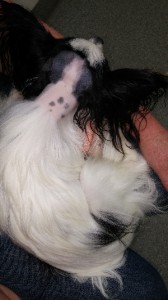[ad_1]
Since my last ‘memoir’ post quite a few weeks back about little Indy’s trip to hospital for a suspected ‘raw chicken bone obstruction’ further medical events have unfolded which ultimately has resulted in Indy being diagnosed with “Steroid-Responsive Meningitis”.
Meningitis is a very serious life threatening condition in which symptoms can wax and wane for weeks and sometimes even months before a correct diagnosis is made. Without early, swift and aggressive treatment the outcome can be devastating.
What Were His Symptoms?
Indy had just been de-sexed and given his 1st booster vaccinations a few days prior. After coming home from hospital he was his usually bouncy and happy self. Around 3 days later things suddenly changed.
He became very lethargic, trembling, completely uninterested in playing, squinting eyes, reluctant to lift his head and unwilling to go outside; when he did he would just stand still in the one spot. This unusual behaviour quickly escalated to yelping in pain whenever I would pat him or attempt to pick him up.

Head Down & Reluctant To Play
I called the vet and explained Indy’s behaviour in detail. The vet thought Indy may have behaviourial issues; he prescribed “a very safe drug” (Endep) to treat it. I looked up “Endep” only to discover it can have some very nasty side effects. Safe? Not in my opinion!
I decided against the drug prescribed and rather sourced a second opinion at Monier Vet.
After a thorough examination the new vet recommended an antibiotic injection (Norocalv) in-case of a possible infection, anti-inflammatory injection (Reliven) to reduce his fever and antibiotic tablets (Clavulox) to take home. Indy was booked in again the following morning for a re-check to see if the fever had reduced. I was given very clear instruction that if Indy was to change in anyway overnight I was to take him to Animal Emergency Service.
The following morning Indy still had a fever and was dehydrated. IV Fluids and further tests were necessary to get to the bottom of his “Pyrexia” (unexplained fever) and treatment in Emergency as 24/7 care was highly recommended. Indy was a very sick boy.
How Was It Diagnosed?
Emergency vet; Dr Alex Hynes went through Indy’s entire medical history, including his recent trip around 8 weeks prior to emergency also for “Pyrexia”. With this recent history of on and off again fever, lethargy and taking into account his age his symptoms were classic for Meningitis.
The test to check for Meningitis is called a “Cerebrospinal Fluid” (CSF) collection, which looks at the fluid that surrounds the brain and spinal cord and it does not come without a number of potential risks; ‘Bleeding into the spine’, ‘Paralysis’, ‘Brain Damage’ and ‘Seizures’. A few other tests were run to rule out any other conditions before going down the path of a CSF.

Intensive Care In Emergency
Indy had; Pain Relief, IV Fluids, Bloods – PCV/TP and venous blood gas, CBC/Biochemistry, Sterile Urine SG/Clinistix and Abdominal Ultrasound all of which came back with no markers of any other medical condition, including “Lyme Disease” (bloods were sent to the USA) and Distemper. The next step was the CSF test.
The Cytology (Smear) from the CSF indicated a positive result for “Meningitis”.

After “Cerebrospinal Fluid” (CSF) Test
What Is The Treatment?
There are a few types of Meningitis, the most common being “Steroid Responsive” and the other “Bacterial”. Both are treated with different medications. Indy was treated for both common forms until the results came back a few days later. He had “Prednisone” for the steroid responsive Meningitis and “Tribressen” antibiotic to penetrate the blood brain barrier to treat the bacterial form of Meningitis. Because Indy had recently had his heartworm preventative, they also ran tests to rule out “Parasitic Meningitis”. The parasites become nomadic after worming treatment and that is when symptoms can arise.
Indy’s diagnosis: “Steroid Responsive Meningitis”.
So What Now?
When Indy came home he had to be monitored very closely for seizures. I have never felt so sick with worry. Amber knew something was wrong and for the following week refused to leave his side for a minute. Thankfully he never had a seizure and has responded really well to the steroid treatment.

Amber Refuses To Leave Indy’s Side
Steroids do have a few side effects such as increased thirst and urination, increased hunger, panting (especially dogs), general loss of energy, developing or worsening of infections (especially bacterial skin infections) and vomiting or nausea (less common). It can also increase the risk of Pancreatitis and Gastrointestinal Ulceration. Dogs may suffer from all or just some of the side effects depending on dosage, age, response etc.
Indy is extremely hungry all the time and has put on some weight. Because of Indy’s new tendency to steal food, quite literally ripped from Amber’s mouth, dinner time is offered in separate rooms. This is the only way I know for sure each is getting their daily nutritional allowance and to prevent food guarding and disputes.

Waiting For Dinner To Be Prepared!
The first few weeks Indy had no energy at all and seemed really reluctant to do anything. It was so sad to watch my usually very cheeky and playful boy looking so sad and depressed. However the last few weeks I have seen great improvement and my cheeky boy is starting to shine again. He is slowly becoming like his old self.
Indy was also seen be specialist Dr Terry King at the Veterinary Specialist Services who provided such wonderful care; while our new regular vets at Monier Vet are carefully managing the condition under Dr King’s guidance. His medical plan ideally is to reduce the high dose steroid to none. He is currently on 5mg a day and the dosage will reduce every 4 weeks by ¼ a tablet. Then we move over to 1mg tablets, again reducing by ¼ a tablet every 4 weeks, until hopefully he requires no medication at all.
It is extremely important that this is done at a very slow and controlled rate which should take around 6 months. Reducing the medication too quickly or stopping altogether is extremely dangerous and comes with a very high risk of the Meningitis returning quickly and aggressively. I remain in regular contact with both specialist and general vet to give them a report on Indy’s progress and to be provided direction prior to each dosage reduction.
We have started the 1st stage of the steroid reduction and am relieved to say that Indy is doing really well.

Not 100% Himself. But Doing Well!
Is It Contagious?
No. It is not contagious and can not be “passed on” to you or your other pets. Canine Meningitis is not like the contagious form that human’s contract.
Could It Come Back?
Yes. There is a chance that Meningitis can return.
The specialist advised generally 50% of dogs with “Steroid Responsive Meningitis” respond very well to treatment and eventually become drug free, 25% are able to reduce to a low dose of Prednisone for life and the remaining 25% very sadly have a ‘roller coaster’ ride and battle with the disease for the rest of their lives. Some succumbing to the disease or a secondary one.
Will Indy Recover?
Sometimes Meningitis can be linked to a number of other conditions. In 6 months time, when Indy is drug free, the specialist has recommended further blood work to rule out another underlying condition. With that said he was very optimistic with Indy’s response to treatment so far, he should make a full recovery.
To the team at Monier Vet, Animal Emergency Service, Veterinary Specialist Services and personally to Dr Alex Hynes & Dr Terry King for everything you all did for Indy. For without each and everyone of you Indy would not be with me today.
I will keep you updated on Indy’s progress both on this blog and our instagram page.
I would love to hear from anyone else that has a dog with Meningitis.

Enjoying A Nap…Just The Way He Likes It!
Has Your Dog Just Been Diagnosed With Meningitis?
This Message Is For You:
After Indy diagnosis I became totally consumed with scouring the internet for anything encouraging I could find on Meningitis. It was hard going, their are so many articles and the majority are very upsetting and so heartbreaking that you find yourself at the point of total helplessness. You may feel that all is lost. I have spoken to so many people; family, friends and complete strangers who have had their own dogs struck down with this terrible condition.
The one very important thing I have learned is
– Every dog’s journey with Meningitis is different.
Do not give up. There is hope.
A very special ‘Thank You’ goes to Josie’s Story for all of your advice and encouraging words when I needed them most.
Josie your strength is inspiring! I dedicate this post to you.
Update: Josie crossed the Rainbow Bridge in 2017. RIP Warrior Princess 2007-2017 Beautiful Josie
To “Brandy” and her loving family – who never gave up.
Brandy was Amber and Indy’s fur-friend.
Diagnosed with “Meningitis” and then a further secondary disease “Chiari Syndrome”. Such a brave and strong girl, but the fight was just too much.

Author Bio: Nikki is pack leader at Pressplay Pets, a blog for the modern age pet parent interested in health & care, news, reviews & personal accounts of unconditional love & at times heartfelt pain of pet parenting. She is also proud mum to cute and cheeky Papillons ‘Amber’ and ‘Indy’ and one crazy Rainbow Lorikeet named ‘Ralph’! Follow my Instagram and Facebook and Twitter.
Pressplay Pets a blog for the modern age pet parent interested in health & care, news, reviews & personal accounts of unconditional love & at times heartfelt pain of pet parenting!
Follow Us! ![]()
![]()
![]()
![]()
![]()
![]()
[ad_2]
Source by [author_name]



